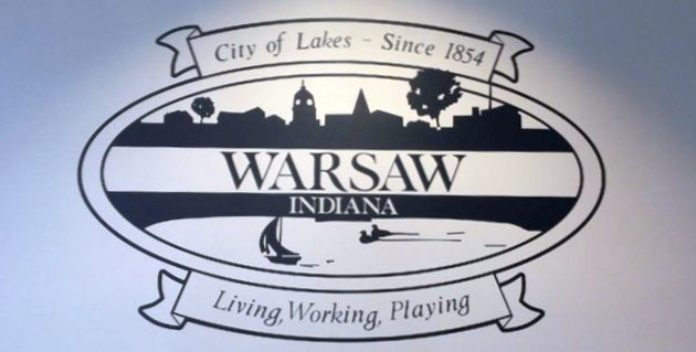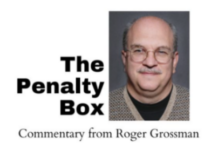With no remonstrators voicing opposition to it, the Warsaw Common Council unanimously passed a trash fee ordinance Monday night on first reading after an advertised public hearing.
The second and final reading will be at the 7 p.m. May 17 Council meeting at City Hall.
The ordinance was introduced at the Council meeting two weeks ago. It establishes a collection charge of $8 per month per residential unit from July 1, 2021, to June 30, 2022. The fee then increases $1 annually until it reaches $12 per month per residential unit July 25, 2025, and beyond.
The fee applies to private residences and residential buildings containing not more than four individual dwelling units within the city. It will be billed on the utility bills of city utility customers that receive city trash collection; or billed to owners of residential property not connected to city utilities but that receive city trash collection. The monthly fee will be applied each month and there will allowed no temporary vacation of the charged fee, according to the ordinance.
Residential buildings containing two to four individual dwelling units in the city may request to opt out of the city’s trash service for one year at a time by completing and submitting an opt-out form provided by the Warsaw Street Department’s office.
Another part of the ordinance states that beginning July 1, 2021, “vegetative matter resulting from landscaping maintenance may be set out for garbage collection. Grass clippings, leaves and other vegetative matter must be containerized in biodegradable paper lawn bags or refuse storage containers. In the fall, leaves will be collected by the city street department loose or in biodegradable paper lawn bags during the fall collection season.”
Mayor Joe Thallemer started the discussion on the trash fee ordinance by reviewing how the property tax circuit breakers have affected the city’s finances.
“Creation of the user fee for curbside waste pick-up has been a recommendation from our financial consultants for several years. It’s primarily the result of continued historical increases of circuit breaker credits which results in losses, lost revenue, and subsequent downward trend in our reserves. That’s something that’s been going on really since this whole thing started,” Thallemer said.
In 2011, he said circuit breaker losses for the city were about $308,000, or about 3%. He said the projections have that almost tripling to 2022 to possibly $948,000. “So, obviously, that’s a concern we’ve got. Many communities have much larger circuit breaker losses. I think ours are just finally catching up. Many larger communities have mostly anywhere from 25 to 50 percent circuit breaker losses,” he said.
Warsaw has been relatively fortunate, he said, but over time it just continues to increase.
“But property tax revenues are just not keeping up with the demand for service, and the answer is clearly the circuit breaker tax losses,” Thallemer said.
Circuit breakers began with full impact in 2010, he said. In 2007, before circuit breakers, 80% of the city’s budget was funded by property tax. In 2021, that’s dropped down to 56%.
Street Superintendent Dustin Dillon then gave a 14-minute presentation on refuse collection in Warsaw.
He said some of the issues with refuse collection are the rising costs, cans left out on the street, large item pickups, keeping alleys clean and maintained, trash route mapping, efficiency of service and the flexibility of doing things in-house. Some of the proactive measures the Street Department has taken to combat those issues include having the street sweeping crew run a day behind the trash route; awareness tags; using a bigger truck for large item pickups; keeping alleys clean; rerouting traffic maps; and using the one-armed truck.
The Street Department has been pushing the paper bags for a while now, Dillon said. The ordinance mentions the paper bags, and he said his department has already bought a number of them. For composting, there can’t be any plastic bags at all, and getting rid of them and moving to composting will cut down on the department’s grinding costs. Dillon said the department spends about $40,000 a year on grinding leaves, brush, etc. The money saved on the grinding costs will be used to purchase the paper bags for residences – five per residence per month.
Dillon presented a slide with the 2020 disposal fees. Trash pick-up expenses includes $20,000 a year for fuel; $60,000 for tires, repairs, maintenance; $65,714.29 for two main garbage trucks; $31,404.34 for trash carts; $152,820 for landfill fees; $238,983.90 for employee wages with benefits. Yard waste expenses include $7,500 for fuel; $8,000 for tires, repairs, maintenance; $10,000 for two main follow trucks; $39,836 for grinding fees; $14,663.20 for grapple truck; and $131,386.09 for employee wages with benefits. The total of the household trash, yard waste and $135,168 for recycling is $915,475.82.
Back in 2008, he said, they were about $735,000 in cost for refuse. He said now the city is at over $915,000 per year. In 2008, there were 3,906 trash stops but close to 4,600 now.
After Thallemer went through the ordinance with the Council, the three members of the Council’s trash fee committee – Jerry Frush, Josh Finch and Mike Klondaris – spoke.
“I know we sat and talked this over for a long time, and we tried to do our citizens of Warsaw the best that we could do. We felt that if we tried to hire somebody from out of town to come in, such as Fort Wayne had done – if you see the newspapers you can see what happened over there. They just don’t get the good, 100% efficient service that we get. I think we get the greatest service of any local areas around,” Frush said.
Klondaris said they “thought of almost every option that we could.” With property taxes staying low, he said the $8 a month was a “win-win” and not an excessive fee to “have a white-glove trash service, yard waste pickup, leaf pickup in the fall and recycling.”
Finch echoed Frush’s and Klondaris’ comments and said it came down to what was best for the city.
Councilwoman Diane Quance asked, “With our goal of $12 by July 2025, what amount of revenue are we estimating that will raise by then?” She said she knew the city wouldn’t know exactly but asked for an estimate or goal.
Thallemer said they figured out it was a little over $16 per dwelling unit per month to provide the service, so beginning at $8 for the first year was only charging about half that. In 2025, the $12 a month still wasn’t reaching the full cost for the city, and “who knows what the costs will do” between now and then, he said.
When Thallemer opened up the meeting for public comments, no one spoke up at the meeting or texted in for or against the ordinance. Resident Jamal Smith asked why they were being held to five bags a month, but Dillon said they could have more than five bags of yard waste, but the city was only providing five paper bags a month.
After Klondaris made a motion to accept the ordinance on first reading and Frush seconded it, Council President Jack Wilhite thanked the committee and said the city needs to maintain its services. “I’m a person who believes smaller government is better government. The closer you get your government to the people, the better government you’re going to have,” he said.
The Council then voted 7-0 to approve the ordinance on first reading.
POLICE PAY INCREASES APPROVED ON FIRST READING
To attract and retain police officers, the Warsaw Common Council approved on first reading an ordinance amending the 2021 police salary ordinance to increase the base patrol officer biweekly wage.
The second and final reading will be at the Council’s May 17 meeting.
Mayor Joe Thallemer said, “One of the initiatives I mentioned in this year’s State of the City focused on concerns we face as a city to hire qualified police officers. All law enforcement agencies find themselves competing with other jurisdictions for a relatively small pool of qualified applicants. Our shortage is accentuated locally by growth, annexation, creating a decrease in service area, and increase traffic concerns on U.S. 30.”
Feeling the impact of increasing wages and competing agencies, he said he asked the Council’s wage committee to address the problem and create competitive department wages. The committee has addressed similar problems in other departments, but now is focused on concerns with the Warsaw Police Department, he said. “Police are having an increasingly difficult time finding qualified applicants,” Thallemer said.
“Given the immediate concerns with hiring new police officers, I asked the committee to initiate this proposal to show our commitment to increase the base patrol wage, which will improve our competitiveness to attract new recruits and solidify our department wages for meaningful motivation to career advancement opportunities,” he said.
Warsaw Human Resource Director Jennifer Whitaker said the ordinance requires two readings, with the second one set for May 17. “As Mayor Thallemer was explaining, this ordinance is just a means to recruit police officers for the city of Warsaw. And hopefully the beginning steps to recognize and retain our current officers,” she said.
If the ordinance passes a second time at the May 17 meeting, Whitaker said Clerk-Treasurer Lynne Christiansen will have to recertify the base patrol officer’s wage to the pension. When that happens, and it’s OK’d, she said the recruitment campaign can occur for new and lateral transfers within the WPD.
Thallemer said the base patrol increase is 10% of the base patrol salary. Whitaker said that was correct and came out “to about $200 a pay for the increase.” She said she and the committee – Councilmen Jeff Grose, Diane Quance and Cindy Dobbins – looked at all the date they collected and “we found that Warsaw was really behind, lagging in our base patrol officer wage for the recruitment and retaining of our officers. And that’s where we wanted to focus the amount on.”
The ordinance states the maximum biweekly wage, effective June 27, 2021, for the base patrol officer would be $2,200.64.
Dobbins said, “We did look at several different communities. Some of our size, some larger, some smaller. And it was quite an eye opener to see that we weren’t really measuring up to the task in what we were (paying) our base patrol officers. And knowing also that we have difficult time hiring people, and I think that’s just not Warsaw, I think that’s everywhere because of the nationwide attitude and everything now. I just felt like, once we really delved into it, we just had to really make this effort.”
Grose said he thought the ordinance would benefit the department and the community.
“One of the things that the committee was unanimous on was that as we make a commitment to our officers and provide a top-notch training, we are also going to be asking for a commitment from those officers, which will be spread out over their first five years of service and involve graduated pay that, for training costs incurred by the city. And one of the things that we found is our guys – I think we have the best training department around, and other law enforcement agencies will acknowledge that. They want our officers because they know they are very well trained,” Quance said. “What was happening was we were losing our good, beginning officers that other departments were offering them more as a starting wage once we got them trained. And so, as we make a commitment to them, we’re also asking for a commitment in return from them, that they’ll stick with us.”
Dobbins said there are funds in the budget for the police salary ordinance amendment.
Councilman Josh Finch asked, “Was there discussion around any other reason why somebody might leave besides wages?” He said he’d hate for the Council to implement the wage increase and then find out there is another reason maybe why an officer would be enticed to move on.
Whitaker responded, “I hope not because when I do my exit interviews, when I can get them to have frank dialogue with me, it is, ‘Hey, somebody is going to pay me a couple thousand dollars more.’ … We offer excellent benefits. We have a top-notch training department. … People headhunt our officers once they’ve got two or three years in. … They’re trained and ready to go, and it is a loss. It truly is a loss. They’re throwing money at them.”
Police Chief Scott Whitaker said the contract they worked on with city attorney Scott Reust will help with that.
Quance made a motion to approve the ordinance, Dobbins seconded it and it was approved 7-0 on first reading.





